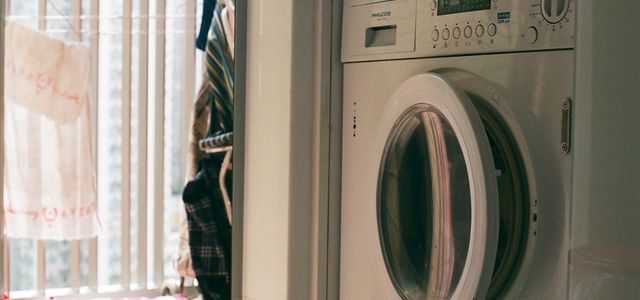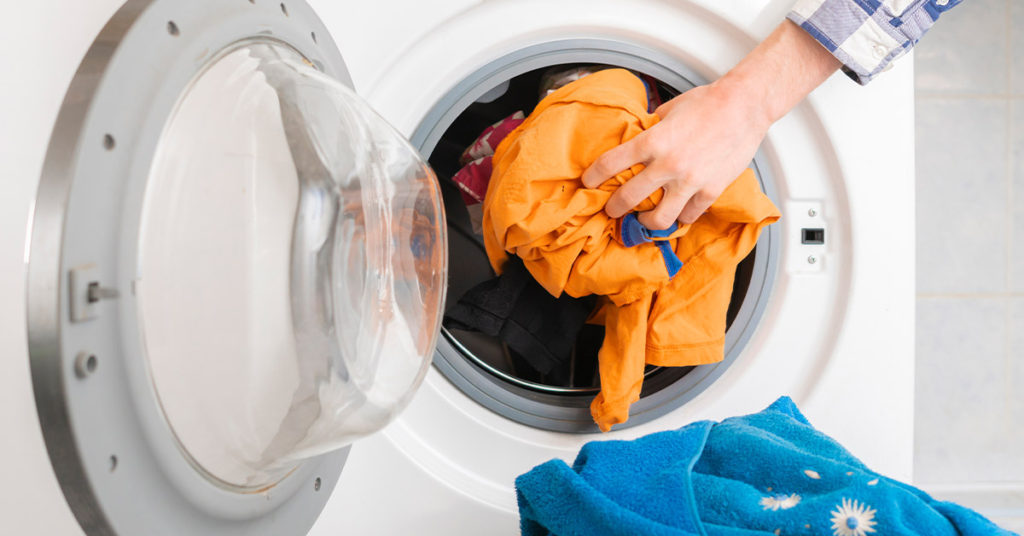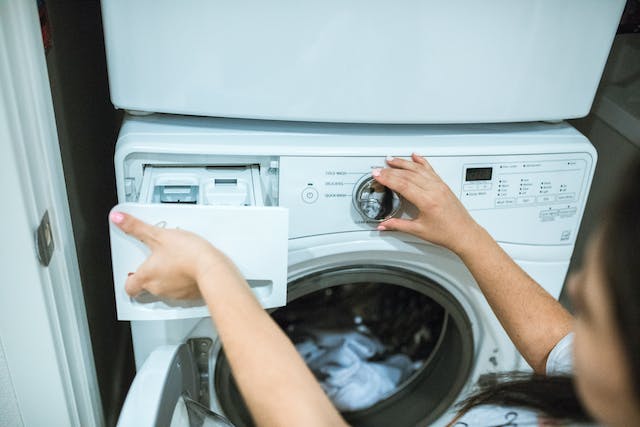Cleaning clothes isn’t just about how they look, it’s also about how they smell. If you’ve been noticing a rotten egg or even a sewer smell coming from your washing machine, it’s time to look into it.

To stop your washing machine smelling you need to understand the source of the problem.
This article explains why you washing machine smells like sewage or rotten eggs, and introduces you how to get rid of the smell from washing machine.
So keep reading!
Why does my wash machine smell like rotten eggs, sewer, or mildew?
The most likely is bacteria growing in your washer because of built-up dirt, mildew and mold, lint, and/or soap. Source: In-House Plumbing Company.
If you don’t regularly clean your washing machine, these things build up on, under, or inside the rubber seal and in the crevices of the drum.
Another possibility but not as common is a natural gas leak. Sewage odors are gases that can have ill health effects if ignored too long. If troubleshooting doesn’t help, then it’s wise to call a plumber as soon as possible.
What is the best thing to clean the inside of a washing machine?
Fixing a rotten egg smell coming from your washing machine by periodically running an empty load with hot water and vinegar.
How do I get rid of the smell from my washing machine?
Bring out the vinegar.

How to clean a smelly washing machine: front loader
- Wipe off the rubber seal surrounding the door with a microfiber towel and a mixture of 2 cups white vinegar and 1 cup baking soda. Scrub away any black mildew.
- To break up residue, run a hot wash cycle with 2 cups of distilled white vinegar. No laundry!
- Sprinkle 1/2 cup baking soda immediately into the drum. Run another hot cycle to cleanse and refresh.
- Fill the detergent dispenser with white vinegar and let it sit for an hour before wiping clean to remove any buildup.
- Pour two cups baking soda and one cup white vinegar down the drain tube (not into the drum). Allow the mixture to bubble for 15 minutes.
How to clean a smelly washing machine: top loader
- In the empty drum, combine 1 cup bleach (or oxygenated bleach powder) with 1 gallon of hot water. Allow 30 minutes to soak before continuing with the usual cycle.
- Pour 2 cups white vinegar into the bleach dispenser and fill to the top with hot water. Agitate on the maximum setting for 1 minute, then soak for an hour.
- Use a toothbrush dipped in baking soda and vinegar to thoroughly clean the agitator.
- To remove soap accumulation, fill the softener dispenser with equal parts hot water and white vinegar. Allow to sit for 2 hours before rinsing clean.
How to clean a smelly washing machine drain
- Pour 1/2 gallon of hot water and then 1 cup of baking soda down the drain to clear the clog. Allow it to sit for 15 minutes.
- Use a wire coat hanger to dislodge any debris that is obstructing the drain tube.
- Rinse with more hot water. Pour in 1 cup bleach and let it soak for 30 minutes before beginning the rinse cycle.
- Be sure to leave the door open after washing to allow moisture to evaporate and prevent mildew growth.

Smelly washing machine home remedy
Wondering how to clean a smelly washer? It’s easy to clean the smelly washing machine and keep it fresh.
Follow the step-by-step guide on how to clean A Smelly Washer:
- Mix ¼ cup of baking soda with ¼ cup of water and add it to your machine’s detergent container.
- Use four cups of plain white (not apple cider) vinegar to a top-load machine or two cups to a front-load model.
- Pour the vinegar into the drum.
- Run a high-temperature cycle.
How to refresh a smelly washing machine?
- Run monthly cleaning cycles with vinegar or oxygenated bleach powder.
- Leave the detergent dispenser drawer open between washes to dry.
- Immediately wipe out any apparent mildew on the door seal.
- Don’t overload the washer; leave enough area for clothes to circulate.
- Allow the drum to air out between loads.
- Clean the drain pump filter regularly.
How often should you clean your washing machine?
To eliminate odors, deep clean your washing machine once every 1-2 months. To prevent mildew accumulation in front-load washers, clean the door seal and gasket on a monthly basis.
Here are some signals that it’s time for a deep clean:
- Visible mold and mildew growth
- Strong musty or rotten egg odor.
- Grime builds up in dispensers.
- Poor detergent rinsing.
- Regularly cleaning out the drum and performing a monthly maintenance wash with vinegar or bleach will also help to prevent unwanted odors.
How to keep your washer from getting so smelly?
The most effective technique to avoid washing machine odors is to prevent them! Here are a few great tips:
- Leave the door open between washes to dry out the drum.
- Don’t overload the machine; allow enough area for garments to flow.
- Use less detergent and switch to a gentle, low-suds formulation.
- Avoid using fabric softener or dryer sheets since they cause residue to build up.
- Clean the dispensers and seals on a regular basis.
- Run a hot cycle once a month using vinegar or bleach powder.
- Unload promptly – do not leave wet garments sitting.
- After washing, wipe off the interior using a microfiber cloth.
With frequent cleaning, you can remove dirt and eliminate unpleasant aromas. Keeping things in order prevents unpleasant situations from developing. So, take a cue from these helpful ideas and enjoy hygienic home laundry once more!
FAQ about smell from washing machine
There are a few reasons and they are usually not serious.
The reason for this is usually simple – you have loosened the dirt and the grime, but it has not been flushed away from the insides of the machine completely.
The most likely is bacteria growing in your washer because of built-up dirt, mildew and mold, lint, and/or soap.
If you’ve just had a new washing machine installed and have used it for the first time, you might find that there is a strange smell coming from your washing machine. This is common, and fortunately it is usually nothing to worry about.
This can become a breeding ground for bacteria to grow and spread. This film of lingering detergent also traps odor particles, so your washer may start to harbor stinky smells. If it gets bad enough, this smell may even start to come off on your clothing.
Sources:
- Washing Machine Smells and How To Get Rid of Them
- Solved! What to Do About a Smelly Washing Machine
- How To Clean A Smelly Washer (And Keep It Smelling Fresh)
- How do you get rid of smells in washing machines?
- Why Does My Washing Machine Smell? (And Some Super Easy Fixes)
- Why does my washing machine smell so bad?
- How to clean a smelly washing machine
- Washer Smells Bad? How to Eliminate Washing Machine Smells and Keep It Odor Free
- How to Clean a Smelly Washer
- How do you get rid of a bad smell in a washing machine?
- My Washing Machine Smells Like Sewage: What to do
- Why your washing machine smells, and how to clean it
- 8 Ways To Prevent Your Washing Machine From Smelling
- This is why your washing machine smells—here’s how to clean it
- Need Your Washer Cleaned – Here’s How To Clean a Smelly Washer
- Why Does My Washing Machine Smell So Bad?
- Why Does My Washing Machine Smell?
- Why Does My Washer Smell Like Mildew?
- The washing machine smells! (and other laundry problems)
FOR MORE ORGANIZED TIPS, HACKS, AND ADVICE:
- How To Organize Kitchen Cabinets: A Step By Step Guide To Make a Small Kitchen Look Bigger
- 10 Refrigerator Organization Ideas On How To Arrange Fridge At Home
- How To Organize Kitchen Utensils – Ultimate Guide on Kitchen Utensils Organization Ideas
- 5 Ways to Use Kelly Green Color in Your Home Design
- Do Tide Pods Really Expire? How to Know If Yours Are Still Good
- Understanding the Shelf Life of Laundry Detergent
- Laundry Room Doors That Shine in Hallways
- Get The Twist On DIY Clothes Wringers
- Tap Cold vs Cold Water: Which is Best for Washing Clothes?
Also, we look at how many hours of sleep are recommended and how to use a sleep cycle calculator to find the best time to wake up.